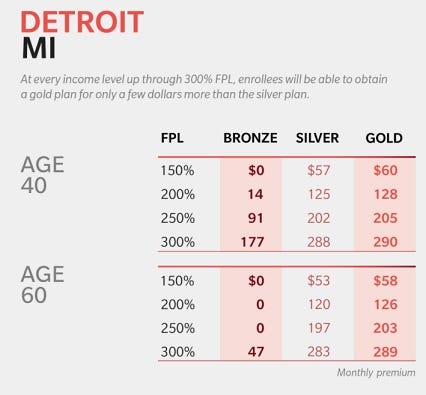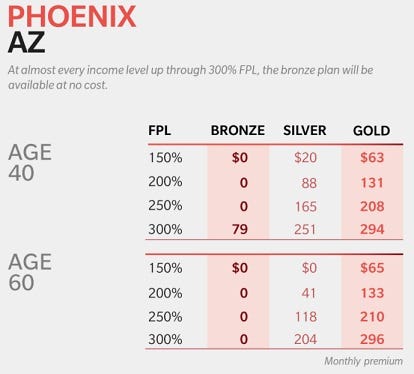Trump’s Latest Attempt to Gut Obamacare Could Backfire Spectacularly
As soon as this week, according to Donald Trump adviser Kellyanne Conway, Trump intends to decide whether to cut off payments intended to stabilize insurance markets and make health care affordable for many Americans with modest incomes.
Trump apparently believes that cutting off these payments will help “implode” Obamacare. Yet, if Trump should stop the payments, that could have the unintended effect of expanding access to health insurance, even potentially making some health plans free for many families of modest means.
The reason why involves a fairly complicated formula governing how most Obamacare exchange customers pay for their health plans, and Trump’s apparent unfamiliarity with how that formula operates.
A tale of two subsidies
Most health plans sold in the Affordable Care Act’s exchanges are classified as “Bronze,” “Silver,” “Gold,” or “Platinum” plans, depending on how much coverage they offer participants. Individuals who earn below a certain income level receive a tax credit to help them pay their insurance premiums. The size of this subsidy is tied to the second-cheapest silver plan available in a particular market.
Thus, as the cost of purchasing a silver plan increases, so too does the amount the government pitches in to help people pay for their insurance.
Absent an act of Congress, Trump cannot cut off these tax credits. A 2016 court decision, however, potentially gives Trump the ability to cut off a different set of Affordable Care Act subsidies (though there may be another legal path that would allow insurers to effectively turn these subsidies back on).
These subsidies, known as Cost Sharing Reductions (CSR), compensate insurers for complying with one of their obligations. Under Obamacare, insurers must reduce deductibles, co-payments, and similar expenses paid by some of their consumers in the Affordable Care Act exchanges. The federal government then reimburses the insurer for doing so through CSR payments.
So, if Trump cuts off CSR payments, he will blow a hole in many insurers’ budgets. The insurers, meanwhile, will likely compensate for this lost income by jacking up premiums — and that’s where things start to get interesting and unpredictable.
Free health plans!
As actuaries Dianna Welch and Kurt Giesa note in an analysis of what would happen if the CSR payments are cut off, “CSR are only available under silver-level exchange plans.” Thus, if Trump does cut off these payments, it is likely that premiums for bronze, gold, and platinum health plans would remain fairly constant. After all, shutting down CSR payments has no immediate impact on the cost of insuring a bronze, gold, or platinum health consumer.
Now here’s the part where things get weird. Recall that the value of the tax credits paid out to help people afford their premiums are tied to the cost of the second-least expensive silver plan — so those tax credits gain value as silver-level premiums rise.
So even as premiums in the bronze, gold, and platinum markets stay more or less the same, the amount the government will pay to help cover those premiums will spike in a world without CSR. The result, according to Welch and Giesa, is that many people will be able to obtain bronze plans for no cost at all — or, alternatively, they will be able to purchase much more generous gold plans for barely more than the cost of a silver plan.
It should be noted that the actual impact of cutting off CSR payments will vary from market to market, and it will also vary depending on the age and income levels of individual consumers. In Detroit, Welch and Giesa predicit that a 60 year-old earning up to 250% of the federal poverty rate (just over $40,000 for a married couple living alone) will be able to receive a bronze plan for free. Alternatively, they can opt for a gold plan at much the same cost as a silver plan.

CREDIT: Oliver Wyman Actuarial Consulting
In Phoenix, meanwhile, a 60 year-old earning as much as 300 percent of the poverty rate (or about $48,000 for the same unmarried couple) could receive a bronze plan for free. Gold plans, however, would remain significantly more expensive than bronze plans.

CREDIT: Oliver Wyman Actuarial Consulting
Even with the CSR payments intact, the Affordable Care act does make trade offs. It tends to leave people with relatively modest incomes better off, for example, and some people with higher incomes somewhat worse off. Cutting off CSR payments would likely exaggerate many of these trade offs, saddling relatively affluent individuals with much higher premiums and potentially giving a windfall to many people with much lower incomes.
In attempting to undercut a major segment of America’s safety net, in other words, Trump could wind up transferring wealth downward.

